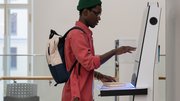News
AVATAR kiosk could help U.S. border protection
August 15, 2012
U.S. Customs and Border Protection is testing a lie-detecting kiosk at Dennis DeConcini Port in Nogales, Ariz. The virtual border patrol agent, nicknamed Elvis, screens travelers who wish to enroll in the CBP’s "Trusted Travelers Program."
Officially known as AVATAR, an acronym for Automated Virtual Agent for Truth Assessments in Real-Time, the kiosk uses three separate sensors to screen passengers for unusual physiological responses to questioning: a microphone, which monitors vocal qualities like pitch and frequency; an infrared camera, which looks at pupil dilation and the direction of eye focus; and a high-definition camera that records facial expressions.
Travelers stand in front of the kiosk and come face-to-face with the digital image of a caucasion male, who asks them a series of yes or no questions. Following the interview, applicants are biometrically fingerprinted, via the kiosk, and any suspicious or unusual responses or activities are referred to a human agent.
Doug Derrick, a member of the University of Arizona team that collaborated with CBP for the project, told CNN.com that the kiosk showed promise.
"People are accurate about 54 percent of the time at detecting deception," Derrick said. "We have got our machine as high as 90 percent in the lab."
If the trial phase of AVATAR is successful, the kiosk could be used in other parts of CBP’s operations.
Read more about government.










